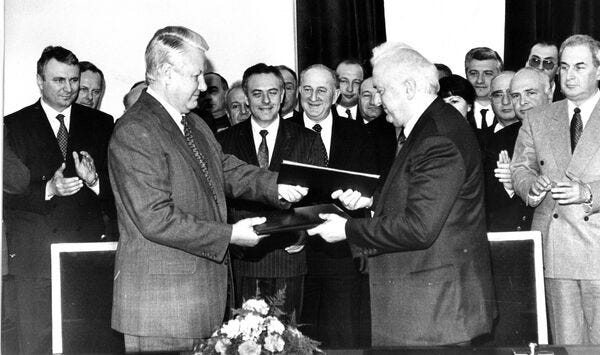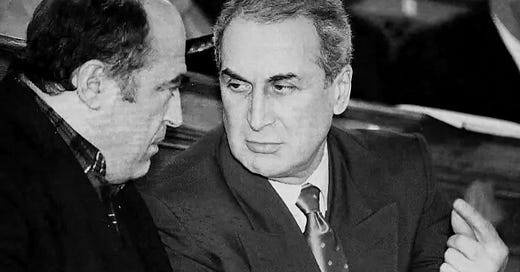Jaba Ioseliani: 'War is War'
Ioseliani commenting on the looting carried out by Georgian invaders against Armenians living in Abkhazia.
Below is from the interview with Jaba Ioseliani, founder of the Mkhedrioni armed group, published in Nezavisimaya Gazeta on 9 September 1992. In the interview, Ioseliani commenting on the looting carried out by Georgian invaders against Armenians living in Abkhazia.
After reading the transcript, you can explore the various excerpts from other sources provided below, which offer corroborating evidence and different perspectives on the events described by Jaba Ioseliani. These sources further illustrate the experiences of the Armenian population during the Georgian-Abkhazian conflict and provide a broader context to the incidents of looting and abuses mentioned in the interview.
– Armenian refugees claim that the Georgian army is engaged in widespread looting.
[Ioseliani] – You know, that did happen, but not anymore. We are sending a few looters to Tbilisi, where they will be tried. You see, where there’s war, there’s violence. And where there’s violence, there’s looting. Do you think war is just about shooting? Yes, unfortunately, it happened. For example, cars were seized.
– Cars are still being taken 'for military purposes' today.
– But they won’t vanish – they won’t sail away on the sea! There was no sadism. Only petty thefts occurred. Yes, cars were taken.
– Refugees didn’t report killings or rapes. But they claim that Georgian soldiers enter homes and take everything.
– No, that has now stopped. For the past two days, there hasn’t been a single case like that. In some areas, Armenian homes were indeed entered under the pretext that Abkhazian snipers were hiding there.
– In the village of Leselidze, two Georgian guards approached me, heavily intoxicated, and jokingly pointed their guns at me. It was clear these men were no longer in control of their actions.
– I can’t argue with that. It may well be true. War is war.

In the autumn of 1992, Georgian General Giorgi Karkarashvili, who infamously threatened the entire Abkhazian population with genocide on television, acknowledged the crimes committed against Armenians in Abkhazia during the early days of the war. In the 2009 documentary Absence of Will, he stated:
"Unfortunately, we entered Abkhazia in a very disorganised way. We didn’t even have a specific goal and we started looting villages along the way. As a result, in the space of a month, we managed to make enemies of the entire local population, especially the Armenians."
The UNPO mission, in its 1992 report following a visit to Abkhazia, described the situation as follows:
"The Mission obtained sufficient evidence to conclude that gross and systematic violations of human rights had occurred at the hands of Georgian troops in Abkhazia throughout the period since August 14, 1992; that these included serious violations committed against Abkhazian and other ethnic population groups in cities and villages; that civilians were the primary victims of Georgian abuses; that Georgian attacks were directed against persons identifiable as Abkhazian, and that particular attack was directed against Abkhazian political, cultural, intellectual and community leaders; that in addition to Abkhazians, Armenians, Russians, Greeks, Ukrainians, Estonians, and other non-Georgian minorities in Abkhazia have suffered similar treatment by Georgian authorities."
The book Mobilizing in Uncertainty Collective Identities and War in Abkhazia (Cornell University Press, 2021), in its chapter titled Georgian Brutality and Local Support, provides even more harrowing details:
"In this context, the Abkhaz-controlled territory felt relatively safe for the Abkhaz and other non-Georgian minorities who did not want to take the Georgian side or participate in the war. 'In Gudauta,' a Russian woman who fled from the capital says, 'there was a feeling of home, order, it was calm there. No one robbed anyone, there was no horror like in Sukhum.' 'Armenian village[s] saw horrible destruction. . . . Many came to Gudauta and told me these stories,' a member of Abkhazia’s presidium says. As a nurse stationed at the Gumista front line from the first days of the war confirms, 'I saw how frightened Armenians ran from Sukhum. Georgians gathered all Armenians in a village, said, "Give us money and you will live." Armenians gave the money, but then other Georgian groups came. And in the end, there was no more money or gold left. They burned some Armenians alive in their houses. And so they ran, and we helped them cross the river.'"
The targets of the Georgian invaders during the 1992-93 war were not only Abkhazians but all non-Georgians. This is why minority groups living in Abkhazia, including Armenians, fought alongside the Abkhazians against the Georgian occupiers. The Armenians, in particular, formed the 'Bagramyan Battalion' and actively resisted the Georgian forces.
Further reading
+ Armenians and Abkhaz Ethnic Democracy – Current Trends, Future Prospects, by Richard Berge
+ The Armenian Community of Abkhazia: The Republic of Abkhazia Has Chosen to be Independent





